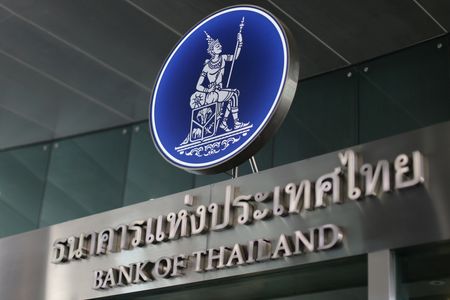By Orathai Sriring and Kitiphong Thaichareon
BANGKOK (Reuters) – Thailand’s economy is expected to grow at its potential rate by late this year or early in 2025, while the policy interest rate is neutral and not undermining the inflation target, central bank officials said on Wednesday.
Shrugging off government calls for policy easing, the Bank of Thailand (BOT)’s monetary policy committee held the key rate at a more than decade-high of 2.50% for a fourth straight meeting this month, saying the level was consistent with the growth and inflation outlook.
Assistant central bank governor Piti Disyatat reiterated that the current key rate was neutral, but the committee was ready to adjust it if needed. The next rate review is on Aug. 21.
“If there are shocks, either the economy has accelerated a lot… or there is a negative shock such as very bad exports, we will have to reassess (monetary policy),” he added.
The government has been at loggerheads with the central bank for months over interest rates, with Prime Minister Srettha Thavisin calling for a rate cut to revive Southeast Asia’s second-largest economy.
of the June 12 meeting showed the policy committee assessed risks to the Thai economy had become less tilted to the downside, but they expressed concerns over the “K-shaped” economic recovery, where different sectors recover from a slowdown at different rates.
The BOT has forecast economic growth of 2.6% this year and 3% next year. Last year’s expansion of 1.9% lagged regional peers.
Piti, who said growth should return to its potential rate late this year or by early 2025, reiterated that growth was expected at over 2% in the second quarter, close to 3% in the third quarter and close to 4% in the final quarter. First-quarter growth was 1.5% on the year.
Governor Sethaput Suthiwartnarueput told Reuters in January that Thailand’s long-term growth potential was estimated in a range of 3%.
On Monday, Piti also said the interest rate level was “quite robust to many scenarios and inflation was not a problem for households and businesses.
Senior director Surach Tanboon said the current inflation target range of 1% to 3% was functioning well, with medium-term inflation expectations still consistent with the target.
Headline inflation is expected to be below the target range in the third quarter before returning to the range in the fourth quarter, he said.
Surach said the annual headline inflation rate in June was expected to be less than May’s 1.54%, which was driven by low base effects.
Monetary policy is not the cause of low inflation or a tool for fixing household debt problems, Piti said, adding Thailand needed to address structural problems and bring in new industries.
The government is seeking to review the inflation target, saying a change should raise the chance of a rate cut, which will also help reduce people’s debt burdens, with household debt at 91.3% of GDP, among the highest in Asia.
(Reporting by Orathai Sriring; Kitiphong Thaichareon and Thanadech Staporncharnchai; Editing by John Mair, Ed Davies)









